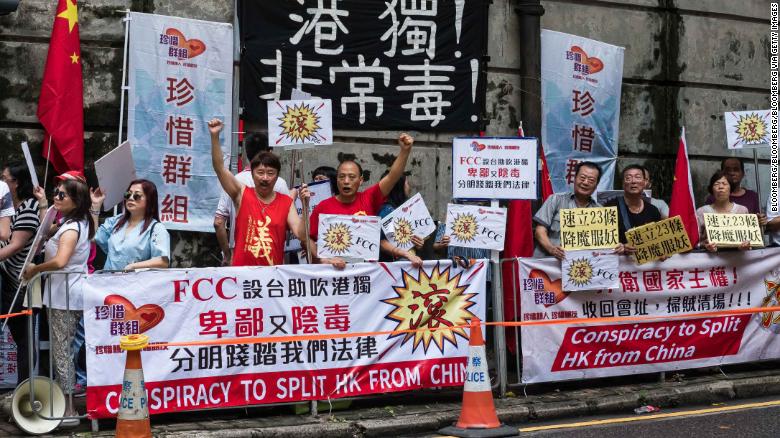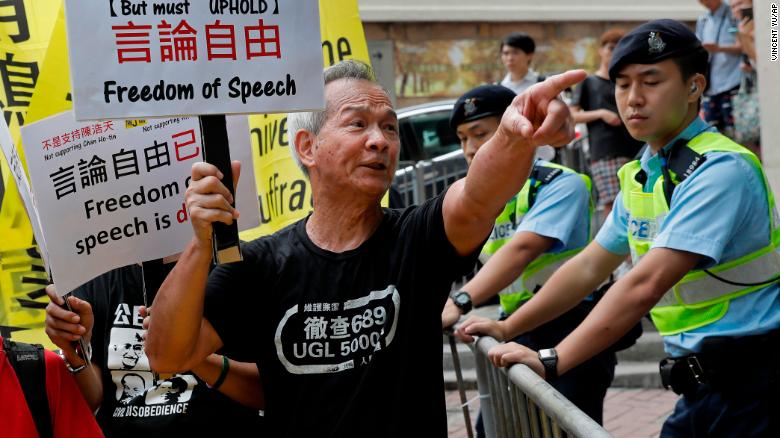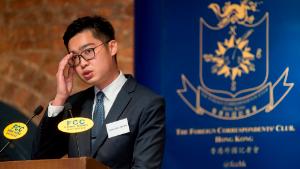'China is an empire': Hong Kong independence talk held amid protests
A hotly anticipated speech by a pro-Hong Kong independence activist went ahead Tuesday at the city's Foreign Correspondents' Club, amid government pressure and protests by pro-China groups.
Andy Chan, founder of the Hong Kong National Party addressed a packed house and tens of thousands on a live Facebook feed, equating Hong Kong's position under China to its former colonial past.
"We were once colonized by the Brits, and now we are colonized by the Chinese, where is our right to determine our own future?" said Chan, who also warned that Hong Kong could follow the path of Tibet and Xinjiang, where China has recently been accused of imprisoning hundreds of thousands of Uyghur Muslims.
The FCC said it received "representations" from the Chinese Ministry of Foreign Affairs (MOFA) in Hong Kong, though it did not elaborate on what was communicated. Hong Kong's Chief Executive Carrie Lam said she "regretted" the FCC's decision to host Chan, while her predecessor, CY Leung, repeatedly called for the event to be called off.
In a statement Tuesday, MOFA called Chan's speech an "abuse of freedoms of press and speech," and accused the FCC of endorsing his views.

Pro-China protesters hold banners during a demonstration outside the Foreign Correspondents' Club in Hong Kong, on August 14, 2018.
A perceived attempt by the government to censor Chan's talk made front page news in Hong Kong, and the event attracted a huge media presence, as well as protests by groups calling for it to be canceled, and for the implementation of an anti-sedition law.
"By virtue of its historical, geographical and cultural difference, Hong Kong is a truly separate entity from the so-called Chinese nation," Chan said, describing China as an empire.
Protesters outside the club waved the Chinese flag and displayed banners warning of a "conspiracy to split Hong Kong from China" and calling for the implementation of an anti-sedition law.
At one point, a fire engine arrived and a large crew of emergency services staff rushed into the building to respond to what turned out to be a false alarm.
Speaking to CNN before the talk, Chan said he was surprised by the amount of pressure which had been brought to bear on the FCC, an elite institution which has had a presence in Hong Kong since the 1940s and frequently hosts politicians and dignitaries.
"We are not armed, we have never advocated for violence, we have never acted violently," he said.

A protester shouts slogans in support of pro-independence activist Andy Chan as he delivers a speech at the Foreign Correspondents Club.
Divisive figure
Chan has largely operated on the periphery of Hong Kong politics since becoming an activist during the 2014 pro-democracy Umbrella Movement.
In 2016, he founded the Hong Kong National Party, which advocates for the city's independence from China and has a few dozen members.
Both he and his party were thrust into the spotlight last month, however, when Hong Kong police announced they were seeking to use a colonial era ordinance to ban HKNP on national security grounds.
Under the Societies Ordinance, if HKNP is banned it will be illegal to be a member of the party, act on its behalf, or raise funds for it. Offenders could face up to three years in prison and fines of up to $12,000. The ordinance has never before been used to ban a political party.
Chan has been given until September 4 to rebut a 700-page police dossier which concludes that a ban on the party is necessary "in the interests of national security, public safety, public order and the protection of the rights and freedoms of others."
News Courtesy: www.cnn.com











